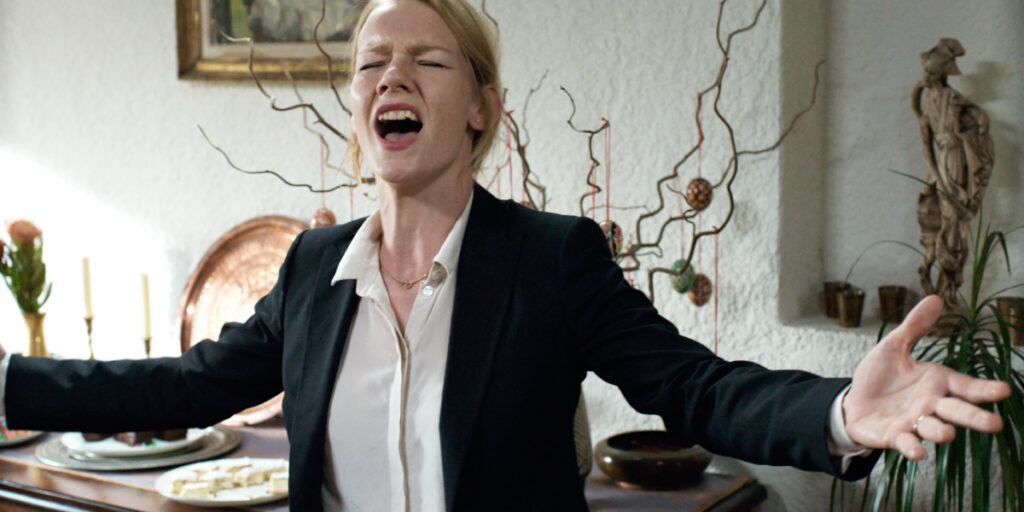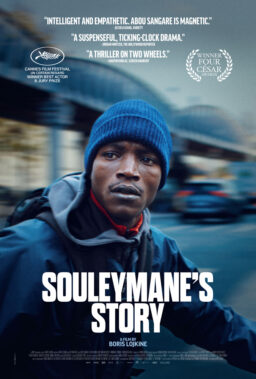A
vast majority of the festival experience is comprised of waiting: waiting on
the tarmac, waiting in line and waiting to encounter greatness in the screening
room. Even if Maren Ade’s “Toni Erdmann”
was the only film I saw at Toronto this year, my trip would’ve been well worth
it. Clearly festivalgoers at Cannes found the film’s irreverent humor a welcome
relief from the usual slate of competent yet downbeat offerings from
all-too-familiar auteurs. A lot of people thought Ade was destined to win the
Palme d’Or, and if there is any justice, the film will garner Oscar voters’
attention following its December 25th bow in U.S. theaters. It is easily one of
the year’s greatest cinematic achievements, though if it were only a laugh
riot, it wouldn’t resonate nearly as deeply.
It’s
rather difficult to sustain laughter over a period of three hours (just look at
the strained mugging that pads out so much of “It’s a Mad, Mad, Mad, Mad
World”). If Ade’s premise was dreamed up in Hollywood during the ’90s, it would
have served as an ideal vehicle for Robin Williams, ever game for playing goofy
nonconformists. As Winifred Conradi, the prankster father with the titular
alter ego, Peter Simonischek has none of Williams’ manic energy, but his
deadpan understatement makes each of his absurdist gags all the more
uproarious. After his beloved dog dies, Conradi leaves Germany to pay a
surprise visit to his daughter, Ines (Sandra Hüller), an uptight management
consultant in Bucharest. Clad in ghoulish fake teeth and a wig that appears to
have been swiped off Tommy Wiseau’s head, her father’s Mrs. Doubtfire-esque
portrayal of the fictional Toni Erdmann is a source of unending embarrassment
for Ines, though she has nevertheless inherited her father’s compulsion for
performance. At work, she’s required to promote the implementation of
outsourcing as if it will benefit her clients, knowing fully well that it will
result in massive layoffs. Ines believes this is a necessary step in
modernizing the corporate world, and Hüller brings a great deal of conviction
to the character. She’s not an independent shrew in need of being tamed, but a
strong-willed go-getter with a startling boldness of her own.
Winifred
senses his daughter’s unhappiness, which only inflames his desire to indulge in
mischief. Yet after his incessant goading leads Ines to belt out a
show-stopping rendition of Whitney Houston’s “Greatest Love of All,” the tables
have shifted considerably. If guffaws were all Ade was after, this story
would’ve worn thin quickly. The 162-minute running time enables her to linger
on countless moments, mining them of all their conflicted feelings. After
sitting through so many interminable summer blockbusters comprised of tangled,
half-realized plot threads, it’s exhilarating to watch a filmmaker with the
confidence to luxuriate in her narrative, savoring every poignant exchange and
flight of madness. There are stretches in which the film plays as straight
drama, and when the comedy materializes, it is organic and often hysterical.
Without revealing anything, it must be said that the climactic set piece is one
of the most explosively funny sequences I’ve ever seen, and it left the crowd
at the Toronto premiere roaring with glee.

Hüller’s
astonishing performance is one of many fine showcases for actresses at TIFF,
several of which thumb their nose at the studio-sanctioned expiration date for
sexually vibrant women of a certain age. Two of this year’s selections feature
Isabelle Huppert as a divorcée with an ailing mother, a troublesome cat and no
belief whatsoever in the existence of God. Both characters are—shall we say,
transformed by the entrance of a younger man in their lives, though in the case
of Mia Hansen-Løve’s tender “Things to
Come,” it’s a friendly Communist (Roman Kolinka). He’s a former student of
Huppert’s, and though he values her philosophy classes where she taught
students to think for themselves, he doesn’t understand why she maintains her
bourgeois lifestyle rather than help bring about a revolution. The relationship
that develops between these two characters is a strictly platonic one, and
Hansen-Løve avoids all traces of melodrama, opting instead to capture the
relentless flow of life as the narrative jumps ahead days, weeks and months
with a single cut (a brief title card marks when years have passed). The
recurring image of Huppert in forward motion—walking ceaselessly into the
future ahead—encapsulates the film as a whole for both the actress and
director.

When
viewed the day after “Things to Come,” Paul Verhoeven’s “Elle” plays like the darkest of sexual fantasies dreamed up by
Huppert’s professor. This may be as close to a dysfunctional family Christmas
comedy as we’re likely to get from the ever-divisive director, whose cynicism
regarding organized religion—and particularly the sex scandal-laden Catholic
Church—is readily apparent here. As the opening credits fade out, we hear the
sound of Huppert being violently raped in her home. The attacker, we gradually
learn, has a duplicitous nature that requires him to conceal his perversions
beneath a spiritual façade. Huppert’s penchant for remaining unflappable in the
face of crisis is still relatively intact, though her character’s trauma
resurfaces in several effectively jarring moments (one involving her cat). At
first, it seems that her refusal to contact the police is due to her family’s
sordid history. Yet what’s more troubling is the fact that Huppert’s character may have
been turned on by the rapist, and may not be entirely against him returning to
the scene of the crime. At the same time, in an amusing subplot, Huppert
adamantly opposes her son’s involvement with a thoroughly unstable woman. He’s
so willfully blinded by her beauty that he can’t even acknowledge that their
alleged baby has strikingly different skin color.
I
was reminded of Verhoeven’s 2012 picture, “Tricked,” which had a story stitched
together from audience suggestions. That’s sort of how “Elle” plays, as it
veers from one jaw-dropping twist to the next. “Tricked” included a scene where
a supposedly pregnant woman is stabbed in the belly, an image that sounds
horrifying on paper but earned a big laugh onscreen. Some viewers won’t be able
to stomach the rape scenes in “Elle,” but I was able to view them in the
stylized context provided by Verhoeven, who cited “Belle de jour” and Hitchcock
as key inspirations. There’s a crowd-pleasing homage to “Dial M For Murder”
that accentuates the sexual subtext in many of Hitchcock’s attack sequences. Of
course, the primary attraction here is the eternally mesmerizing Huppert, who
has one of the great faces in cinema. Just watch the smile that flickers ever
so slightly after she imagines bludgeoning the rapist’s skull to bits. Or the laugh
that suddenly disrupts her sullen tears while aboard a bus in “Things to Come.”
Her character in Hansen-Løve’s film ponders how life can be lived without a
divine moral compass, and in a way, her character in Verhoeven’s film manages
to answer that question with a straightforward epiphany. Honesty is all we can
rely on to guide us toward what is just, what is uncorrupted and what is
healing. If she is truly being honest with herself, she must realize that a
relationship that leaves her black and blue is not sustainable, let alone
healthy. She has to love herself enough in order to leave it all behind.












